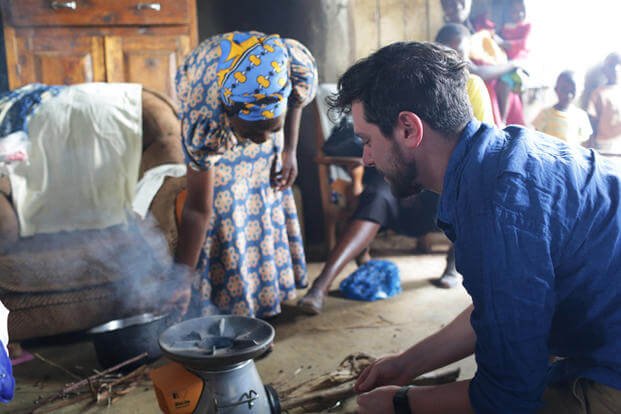BY NATHAN WERTZ - THISANDTHATTECH.COM
Jonathan Cedar is an engineer and co-founder of BioLite in Brooklyn, New York, which creates "off-grid" products that transform the way we cook our food, charge electronic devices, and light up the world around us. Their flagship product is the CampStove, which is a portable biomass stove that leverages thermoelectrics (turning fire into electricity) to simultaneously cook your food, charge devices, or create a source of light. I just reviewed the entire CampStove Bundle over here, which if purchased on December 19th, offers free expedited shipping and guarantees Christmas arrival for our readers.
Jonathan shares his journey of co-founding a business as an engineer, BioLite's mission, being an entrepreneur, and where he sees energy efficiency going in the future.

(Photo: BioLite CampStove and Kettlepot accessory).
Can you give us a bit of your background?
So I was born here in New York City. My family has been in New York for ages. I'm fifth generation Brooklyn.
I always sort of paradoxically been more interested in the country than the city and my grandparents had moved up to Massachusetts and spent all my weekends up there as a kid. I ended up going to college in New Hampshire and spending a bunch of time in the woods, hiking and camping and kayaking and skiing and all kinds of stuff.
Do you have any relation to the military or family members that serve?
Yeah, you know my grandparents and uncles served, and that goes back a little ways, but my grandfather served in World War II. My grandfather landed on the Normandy Beaches, D-Day+1, I think. And my uncle was in the Korean War.

Photo from Britannica. Omaha Beach D-Day plus 1, June 7, 1944. National Archives, Washington D.C..
In our office, though, our head of sales comes from a military family. His mom is a Colonel and I guess she's a physician. And then his dad is in the military as well. I can't remember his rank or role. So he grew up moving all around with his folks who were serving.
What's your educational background and work history before starting BioLite?
Studied engineering in college and went to go work for a consumer product development firm after school building, basically, physical solutions to everyday problems. And so we did a lot of the design work for brands like OXO. They're like ergonomic household goods. We did the Flip video cameras, sort of the precursors to the Go Pros, those one button video cameras back in the early 2000's. Did a bunch of work for Hewlett Packard and Johnson & Johnson and kind of just, I don’t know, like mainstream consumer product problems.
How did you transition to founding BioLite?
BioLite started as a night and weekend project when my co-founder Alec had been given this small, little wood burning stove that had a fan on it. And when it blew air into the fire, it caused the wood to burn a whole lot more like gas than like a smoky campfire. We just thought that was super cool that this fuel that we normally think of as a fuel of last resort or this crummy, smoky, hard to use stuff, if you harnessed it in the right way could really perform like a modern, high-performance, clean fuel. And so that’s really where this all started was just a curiosity around the science of how do you make wood burn like gas.

(Co-Founders Jonathan and Alec)
And you know it turns out the way you do that is you gotta insulate the wood and get it really, really hot and then blow air into the fire that mixes the oxygen with the combustible gases more completely. And if you do that really well, you can burn wood as cleanly as gas, so that it burns down to just CO2 and water vapor, like any kind of really good combustion.
You just need a well-tuned system to do that and one of the biggest limiting factors is you need that fan to force the mixing of the combustion gases. And if your goal is to be completely grid-independent, how do you power a fan like that? And we thought batteries definitely weren't the way to do that, right, because then you're still kind of tied to the grid.
And after experimenting with a million different things, ended up with these devices called thermoelectrics, which are essentially -- I always like to say they're like solar panels for heat instead of light. They're solid states semiconductor materials that when you push heat through them they move electrons. And we can siphon off about 5% of the thermal energy of the fire and convert it into electricity. It sometimes felt to us like a little bit of a perpetual motion machine, right, like the heat from the fire powers the fan, the fan makes the fire hotter and cleaner, and it's like a virtuous cycle.

(How the CampStove works: Light up a fire > wasted heat is captured by the copper probe at the top > heat is converted into electricity via the thermoelectric generator > electricity powers fan as well as the USB port for charging your gear > internal fan blows air into the flames).
And so about two years into working on the early prototypes of the CampStove, and this was sort of like 2006 and '07, we ended up at a conference about advanced wood combustion. Just, again, this is still like hobby curiosity kind of thing. And we're introduced to the fact that half the planet was cooking on essentially campfires in their homes and that the smoke from those fires killed more people than HIV, TB, and malaria combined.
I saw that. 4 million or some high number like that?
Yeah, 4 million premature deaths a year, which is just insane. And we had sort of accidentally created the cleanest technology that anyone had ever seen for off-grid wood combustion. Really just because like it was a hobbyist camper thing for us and I guess we were kind of like right place at the right time.

Photo from Smithsonian Mag and the caption reads: "Because cooking chores often fall to women, they are among the primary victims of smoke-related illnesses." Photo Credit: Ami Vitale/Ripple Effect Images.
So you were simply fixing one of your own problems and you realized, wow, this could fix a ton of problems across the globe?
Yeah, exactly, exactly. And that was really what, for both of us, created the motivation to launch BioLite as a company. We really felt like the need was so great and we felt like as trained engineers with this experience in product development and manufacturing relationships, and the ability to use advanced technologies to apply to a problem like this, really felt compelled to try and build business out of that and see how broadly we could spread this technology.
In 2009 I quit my job to try and do this full time, spent about a year and a half in an incubator in India learning about the needs of the rural markets and what kinds of retailers and distributors reach these last mile, low income customers, how much they can pay for products like this, and stuff like that. And at the same time started conversations with outdoor retailers about whether they could see the camping version of this in their stores.
And so in 2011 we raised a round of financing to launch the business around the model that we call Parallel Innovation, where we create core technologies that change access to energy beyond the grid and that we commercialize them partly for campers because that’s a user we understand very well, being campers. And then a second version of the product for families living in energy poverty in developing countries.
Have you always been passionate about helping other people?
I think I've always been. So I studied engineering and environmental science in school and I think I always felt like energy was this important topic that sat at the intersection of technology, human productivity, and environmental stewardship. And that when done well, it was so incredibly enabling and when done poorly it was so damaging and limiting for people at the same time.
And so I think I've always had a real interest in how to do energy better. Honestly, the emerging markets piece of our business is one that I feel very fortunate to have stumbled onto because I feel like it's always great as an inventor to feel like you're fundamentally changing someone's life. And I think for our camping customers we're a really beneficial part of their lives. I think for our emerging market customers we are totally changing what is possible for them. And that’s just something that feels really great.
It's not a philanthropy, right? It's not like we give a stove in India for every stove we sell in America, but rather we use the revenue from our recreation business to support the market establishment costs for emerging markets. And so when we sell a stove at REI, that goes to pay the salary of an engineer who works on the HomeStove, which sells in India, right, or it pays the salary of marketing or operations person who works on the developing country side of the business.

And the reason that we do that that way is we really believe in order to have impact at scale in emerging markets that it needs to be based on sustainable economics for that consumer. And so if we can build a stove that saves you $80-$100 a year worth of fuel costs for you from less time collecting wood or less money paying for wood or charcoal, and we can sell that to you at $50 or $60, then that’s a good value proposition for that rural customer.
What we really want is we want millions or hundreds of millions of these customers to say, yeah, this is a good upgrade to what I'm already spending on energy. This is just a way to do it more efficiently and safer.
And that ultimately the scaling revenue really comes from that customer, but the capital that builds the system that allows that to happen comes from the recreation market customer.

It seems to parallel the idea of mobile phone usage in underdeveloped countries. In other words, rather than build the infrastructure for landline phones, many just skipped to mobile phones because it was the cheaper alternative.
Well, that’s exactly what we hope is gonna happen here. You know that no one is ever gonna build coal or gas fire power plants in Sub-Saharan Africa. It's all gonna be energy that is generated at the household level and owned by the family.
And it's really exactly like landlines to mobile phones. Like there will never be that intermediate stage of development in developing countries. It's gonna be straight to decentralized technologies and that’s definitely what's happening in energy.
Speaking of decentralized technologies, Tesla recently released a video featuring their solar roof shingles and the Powerwall 2. They are using 14 kWH (kilowatt-hour) batteries and we've seen the cost of solar go down over time. Will we get to the point where we can store massive amounts of energy?
%embed1%
I think it's gonna move in two directions and I think this is more than batteries. Battery technology being insufficient, which, look, there's definitely room for improvement in battery technology. There's no question. But I think one of the big challenges is we're using a generation of appliances today that are incredibly inefficient.
And so I'll give an example: So BioLite doesn’t just work in cooking. We work in cooking, charging, and lighting. And so looking at our lighting products they use about 1% as much energy as the incandescent predecessors did before the LED's, right? And so what that means is we can deliver hundreds of lumens for tens of hours using very, very small amounts of lithium battery, right?
Like we have a product that we call the BaseLantern that just launched. It's 500 lumens for 8 hours using 25 watt hours of stored energy. And so I think more than better battery technology, what we need is more efficient appliances. So I don’t think the goal is to put a Tesla Powerwall unit in your house and continue to use the same washing machine, the same air conditioner, the same overhead lighting. It's about upgrading that whole infrastructure all at once so it can run on much, much lower levels of energy.

Wouldn't we be giving up a lot of power, though? For example, a dishwasher wouldn't be as powerful. In other words, could we still keep 1:1 parity in terms of how well a heavy duty appliance performs?
Well, I think there are a lot of win-win places where we can start. So lighting is a very clear one, right? Like we could instantly cut our lighting load by between 10 and 100-fold by migrating to LED. And that, right there, I mean I don’t have the fractions off the top of my head, but that’s clearly a decent chunk of the energy consumption of your household.
You know entertainment as well, right, where LED televisions are consuming far, far less than certainly the cathode ray predecessors and also the LCD predecessors. I think we can start to look at things like --
Energy efficiency is a huge one around things like insulation. So much cheaper to reinsulate your house and replace your windows than to continue to pay a high energy bill for heating and cooling if you're able to amortize that over five years or more.

And so I think that’s where the steps need to be taken. You know I don’t have a perfect answer for the dishwasher example of do we need lower-powered jets, but I do think there are a bunch of places where it's really clear that there are energy efficiency steps that can be taken today.
And with the right kinds of financing mechanisms, can be done with no cost to the consumer, but with like a financial intermediary to help spread the cost of those capital improvements over time.
Do you have any specific references where your stove technology made drastic changes to a community?
Well, so I've got a great story from a village we visited in Uganda where we worked with a micro-finance bank called FINCA. And so these guys provide low, small denomination loans to BioLite Energy customers.
And one person in this village said to us, "You've taken our village and you’ve turned it into a city." And really feeling like modern energy for cooking and for lighting was essentially like the defining feature of living a modern life. And for them they were calling that the village versus the city, but really saying that this was transformational for them at a very fundamental level that brought them into -- you know that allowed them to participate in the modern world.

Military.com has a lot of active duty and veteran readers that may want to pursue a career in engineering or become an entrepreneur. What kind of advice would you give them to put them on the optimum path?
Sure. I think there are two things. I mean I think one of the steepest pieces of the learning curve for me as an entrepreneur, you know starting out as an engineer, is to really understand there's a lot of technology out there that could have a lot of value, but figuring out how to package it in a way that works as a business I think is the challenge.
And I think really being tough on your assumptions about "who is this product for" and "what will they be willing to pay for something like this" and "what does that mean we have to produce it for to do that sustainably?" I think that’s the hardest part of going from being an engineer to running a business.
And because I meet so many great engineers with great ideas that are way more interested in the technology than the business. And I think the challenge is there is no technology without the business, right? Like that’s the sort of disappointing fact to most people.

And I think having the -- I don’t know, I mean at the first venture capital meeting we went to, we went in and we said we need $300,000 to launch this business and we want a CEO. And they said, ha, that’s hilarious. You know the money, that we can do. If we could give you a CEO, we'd be the most valuable venture capital firm in the world.
I think just that realization that if you're coming at this from a technology standpoint, you're gonna have to learn how to do the business side or bring someone in who does. And I think just recognizing that that’s the biggest gap between having an idea for a technology and seeing that technology get into the world is figuring out all the less sexy business pieces of it.
And recognizing that that’s gonna be a big piece of where you spend your time, way more than the technology. At least that’s been my personal experience and thankfully we have now a great team of engineers who are able to dedicate themselves exclusively to the technology side.
What about burnout or having work/life balance being an entrepreneur? Do you struggle with that or how do you balance that kind of workload?
Oh, God, I have terrible balance. I'm the wrong person to ask. It's really hard. I mean I've been doing this fulltime for seven years, which probably in the grand scheme isn't all that long, but it's really hard running your own business. You know like there is a -- you know every piece really, really matters and makes a big difference.
And our first CFO described a startup in a really beautiful way. He said a startup is like an airplane with a cruising speed of 500, an overspeed of 520, and a stall speed of 480, right? And that just doesn’t leave a lot of room for error. And I think when you're in that situation as a startup it's really hard to sort of say, ah, this will be here tomorrow, I'll deal with it tomorrow. You know? So in short, I have no idea how to create balance. I have no idea.
Is there anything else we missed in telling your story?
I don’t think so. I mean other than our wood burning stoves that generate electricity are certainly -- you know it was what launched the company. It's, I think, the most novel technology we've developed, but it's in service to what I think is a slightly broader perspective on what energy is and what it should be.
You know I don’t think this is about cooking solutions or lighting solutions or solar solutions. I think this is about inventing the next generation of appliances that run themselves sustainably from renewable resources. And that that’s, you know, for some that’s about environmentalism. I think, for us, it's just practicality, right? Like there's a finite amount of resources and yet there is all of this energy that we fail to harness on a daily basis or use really inefficiently.
And so for us this is about creating the next generation of off-grid appliances and creating an ecosystem of those products so that you can cook, you can charge, you can light, eventually you can purify water, you can refrigerate, and do all of that in a much more efficient way that is reliant on the free energy sources that are all around us. And that’s the vision for where we're going.
And I think our CampStoves are certainly the first piece of that and our LED lanterns are the next piece, but this is really about a whole generation of appliances that have yet to be invented and that’s where we're going with it.





